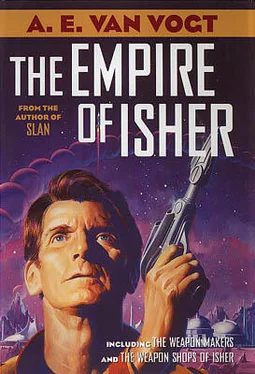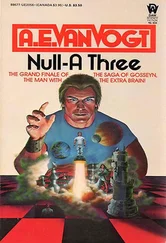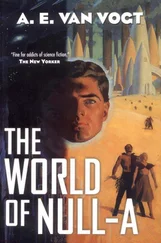“You see,” it said, “ he did attend the others, too. The emotion involved is more than just an artificial extension of paired spermatozoa reacting sympathetically.”
That was all there was, just that comment. But it stopped Hedrock in his tracks. It wasn’t that he had forgotten the spiders. But the memory of them had been pressed into the background of his mind by the urgency of events. And now here was the reality again. He stared up into the blue sky, up at that glorious, yellow-white sun, and hated the spider folk. But that, he realized, was like savages of old shaking their fists and mouthing their maledictions at the evil demons who lurked in the heavens.
He grew calmer, and again fed his sick charges, this time a liquid made of highly digestible fruit juice concentrates dissolved in water. One of the men, a lean, handsome fellow, revived sufficiently to smile up at him in a puzzled fashion, but he asked no questions and Hedrock volunteered no information. When the patients were sleeping again, Hedrock climbed the tallest tree he could find, and studied his surroundings. But there were only trees and rolling hills and far, far away, almost lost in the mist of distance, a wider glint of water. What interested him more were patches of yellow color on a tree a quarter of a mile along the creek. He shinnied to the ground and walked with some excitement, following the stream bed. It must have been farther than he had estimated, for when he came back with a container full of fruit, the sun was past the zenith.
But the trek had done him good; he felt better, more alive; and he was thinking shrewdly: Gil and Kershaw—if one of these chaps was Kershaw—must have visited this planet. They must have tested the fruits they found, and as soon as they recovered sufficiently, they’d be able to tell him whether this yellow stuff was edible. There might even be a pocket analyzer in one of the packing cases.
If there was, he couldn’t find it. But he did uncover a number of instruments, including a recorder for communication disks, used in surveying and marking land sites. They probably had left a lot of those on their various points of landing. The sun lowered itself toward, well, the west. He’d call it that, Hedrock decided wryly. Late in the afternoon, the second sun came up in the east, tinier, a pale orb. For a while, then, it grew warmer, but cooled off when the larger sun sank behind the horizon, and “night” set in. It was like a dull day on Earth, with a ghost of a sun peering through heavy clouds, only the sky wasn’t cloudy and there was none of the humidity and closeness of a dull day. Soft winds blew. The third sun came up, but its dim light seemed to add nothing. A few faint stars showed. The bright gloom began to get on Hedrock’s nerves. He paced along the creek bank, and he thought finally: How long would this…this sensory investigation continue? And why did they want to kill him?
He had not intended it as a direct question to his captors, but, surprisingly, he received an answer at once. It seemed to float at him out of the dim, cloudless sky, precise and supernally dispassionate:
“We are not quite what we seem” the spider-thought said. “ Our race is not, as you suggested, one of Nature’s successes. In this ship is actually the remnant of our people. All of us here present are immortal, the winners in the struggle for supremacy and existence on our planet. Each and every one of us is supreme in some one field by virtue of having destroyed all competition. We intend to remain alive, our existence unsuspected by the several other races in the universe. Because of an accident that precipitated you into our midst, you must die. Is that clear?”
Hedrock had no answer, for here at long last was a completely understandable logic. He was to be killed because he knew too much.
“It is our intention,” said the cold mind at him, “ to make a final investigation of man’s sensory equipment on the basis of what we have discovered through you, and then leave this portion of space forever. The Investigation will take some time. You will please have patience until then. There will be no answers meanwhile to your petty appeals. Conduct yourself accordingly.”
That, too, was clear. Hedrock went back slowly to the camp. The lean, tired-looking man who had smiled at him earlier was sitting up.
“Hello,” he said cheerfully. “My name is Kershaw. Derd Kershaw. Thanks for saving our lives.”
“You’re thanking me too soon,” said Hedrock gruffly.
But the sound of the human voice brought a gathering excitement and, just like that, an idea. He worked, now that the hope had come, with an intense anxiety. He expected to be destroyed momentarily.
The job itself was simple enough. With Gil’s energy gun, he cut trees into little round disks about an inch thick. The disks he kept feeding into the survey recording machine, which imprinted on the elements of each a message stating the position of himself and his companions, describing the spider folk and the threat they had made. For some of the disks, he set the recorder to various anti-gravity pressures, ten feet, twenty feet, fifty—up to five hundred—and watched them float up into the sky to the level their atoms had been adjusted for. They drifted in the vagrant currents of the air. Some just hung around and made him sweat with anger at the slowness with which they scattered. Others whisked out of sight with a satisfying rapidity. Some of them, Hedrock knew, would lodge on hillsides, some in trees, some would float for years, perhaps centuries, prey to every breeze that blew, and every hour that passed they would be more difficult to find, would take longer to search out. The spider folk were going to have a hell of a time preventing the knowledge of their presence from being spread abroad.
The precious days dragged by, and soon there was no doubt that enough time had gone by for the disks to scatter widely.
His patients were slow in recuperating. It was apparent that their bodies were not capable of absorbing properly the food he gave them, and that they needed medical care which was not available. Kershaw was the first to reach the convalescent stage where he wanted to know what had happened. Hedrock showed him the message on one of the disks, which, after three weeks, he was still sending out spasmodically. Kershaw read it and then lay back thoughtfully.
“So that’s what we’re up against,” he said slowly. “What makes you think the disks will do any good?”
Hedrock said, “The spiders are logic hounds. They’ll accept an accomplished fact. The problem is when will the process of distribution of the disks have reached a point where they’ll instantly realize that they can’t possibly ever find all of them? Every little while I think that surely I’ve done enough, and then I begin to wonder just how intricate will distribution have to be before they’ll accept it as decisive. The reason they haven’t bothered us so far is that they’re near Earth studying man’s emotional structure. At least that was their intention, and I was told they wouldn’t talk to me for a while. My guess is they’re too far away for their brand of telepathy.”
“But what are they after?” Kershaw asked.
It was hard to explain what his own experiences with the spiders had taught him, but Hedrock made the attempt. He was careful to give no inkling of his activities on Earth. He finished, “I can break their mental control at any time, so that their only threat against me is physical force.”
Kershaw said, “How do you explain their ability to draw you back to the lifeboat in spite of your resistance?”
“I can only suggest that the nervous system is slow in setting patterns. I was back in the lifeboat before my method of opposition actually went into operation. When it did they recognized what was happening and threatened to destroy me unless I cooperated.”
Читать дальше











